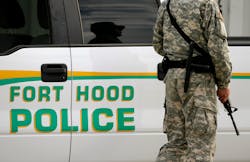Fort Hood Gunman Given Death Sentence
FORT HOOD, Texas (AP) — A military court on Wednesday sentenced Maj. Nidal Hasan to death for the 2009 shooting rampage at Fort Hood, giving the Army psychiatrist a path to the martyrdom he appeared to crave in the attack on unarmed fellow soldiers.
The American-born Muslim, who has said he acted to protect Islamic insurgents abroad from American aggression, never denied being the gunman. In opening statements, he acknowledged to the jury that he pulled the trigger in a crowded waiting room where troops were getting final medical checkups before deploying to Iraq and Afghanistan.
The same jurors who convicted Hasan last week had just two options: either agree unanimously that Hasan should die or watch the 42-year-old get an automatic sentence of life in prison with no chance of parole.
Hasan could become the first American soldier executed in more than half a century. But because the military justice system requires a lengthy appeals process, years or even decades could pass before he is put to death.
The lead prosecutor assured jurors that Hasan would "never be a martyr" despite his attempt to tie the attack to religion.
"He is a criminal. He is a cold-blooded murderer," Col. Mike Mulligan said Wednesday in his final plea for a rare military death sentence. "This is not his gift to God. This is his debt to society. This is the cost of his murderous rampage."
For nearly four years, the federal government has sought to execute Hasan, believing that any sentence short of a lethal injection would deny justice to the families of the dead and the survivors who had believed they were safe behind the gates of the Texas base.
And for just as long, Hasan has seemed content to go to the death chamber for his beliefs. He fired his own attorneys to represent himself, barely put up a defense during a three-week trial and made almost no effort to have his life spared.
Mulligan reminded the jury that Hasan was a trained doctor yet opened fire on defenseless comrades. He "only dealt death," the prosecutor said, so the only appropriate sentence is death.
He was never allowed to argue in front of the jury that the shooting was necessary to protect Islamic and Taliban leaders from American troops. During the trial, Hasan leaked documents to journalists that revealed him telling military mental health workers in 2010 that he could "still be a martyr" if executed.
When Hasan began shooting, the troops were standing in long lines to receive immunizations and doctors' clearance. Thirteen people were killed and more than were 30 wounded. All but one of the dead were soldiers, including a pregnant private who curled on the floor and pleaded for her baby's life.
The attack ended only when Hasan was shot in the back by an officer responding to the shooting. Hasan is now paralyzed from the waist down and uses a wheelchair.
The military called nearly 90 witnesses at the trial and more during the sentencing phase. But Hasan rested his case without calling a single person to testify in his defense and made no closing argument. Even with his life at stake during the sentencing hearing, he made no attempt to question witnesses and gave no final statement to jurors.
Death sentences are rare in the military, which has just five other prisoners on death row. The cases trigger a long appeals process. And the president must give final authorization before any service member is executed. No American soldier has been executed since 1961.
Hasan spent weeks planning the Nov. 5, 2009, attack, including buying the handgun and videotaping a sales clerk showing him how to change the magazine.
He later plunked down $10 at a gun range outside Austin and asked for pointers on how to reload with speed and precision. An instructor said he told Hasan to practice while watching TV or sitting on his couch with the lights off.
When the time came, Hasan stuffed paper towels in the pockets of his cargo pants to muffle the rattling of extra ammo and avoid arousing suspicion. Soldiers testified that Hasan's rapid reloading made it all but impossible to stop him. Investigators recovered 146 shell casings in the medical building and dozens more outside, where Hasan shot at the backs of soldiers fleeing toward the parking lot.
In court, Hasan never played the role of an angry extremist. He didn't get agitated or raise his voice. He addressed the judge as "ma'am" and occasionally whispered "thank you" when prosecutors, in accordance with the rules of evidence, handed Hasan red pill bottles that rattled with bullet fragments removed from those who were shot.
___
Associated Press writer Will Weissert contributed to this report from Fort Hood.

